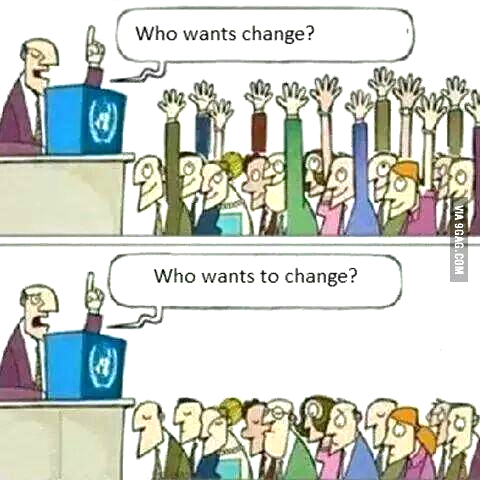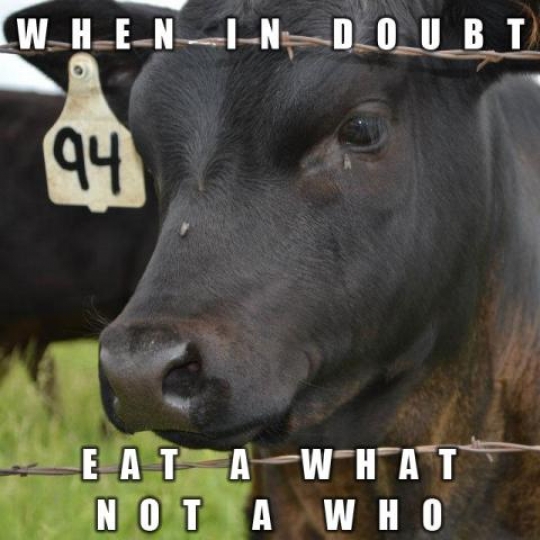Raise your hand if you feel like an oppressor.
...Did you raise your hand?
When you take a moral stance, on some level you're accusing others of taking an immoral stance. When you fight for justice, it must mean some people are unjust. There's not really a way around that unless you draw really vague boundaries.
Something I've seen in all justice movements is that when someone brings up a problem area, an area where we can improve, people rush to defend themselves. It's one of the biggest obstacles to getting any work done in the world. Instead of analyzing what's been presented, we rush to defend our social position as a Good Person.
Our reaction is to be triggered.
Because one of the most important things to us, as social animals, is to maintain good standing in the community. Pride and shame have probably evolved as social emotions that motivate us to protect our social standing. A human without community, and good standing within it, has historically been screwed.
In the rush to defend our good names, we need to argue that the oppression we feel accused of isn't really oppression, whether or not we'd otherwise think so. It's called cognitive dissonance and prevents us from thinking objectively much of the time.
Activist: "This is unjust and people are being hurt."
Everyone else: "But I'm a good person! ...Therefore this isn't really unjust."
It's bad enough that with all kinds of injustice, there are people who personally benefit from it. But what do you if every time someone points out a genuine systemic problem, the general public must rush to say it's not a problem at all?
Arbiters of Morality
Less than a week before this article will be published, there was a minor internet comment explosion centered around an article linking feminism and animal rights.
The article, which is short and succinct, suggests that the moral basis of feminism also supports animal rights. It's a little blunt and doesn't pull any punches. It evoked a reaction far out of proportion to what it actually said.
When it was posted to Facebook by a different feminist popular that I won't name, it generated over a hundred comments by the last time I looked, including people ridiculing the article, people commending it, people arguing with one another over why they shouldn't have ridiculed/commended it, and lots and lots of vitriol.
Several feminists claimed to be personally attacked by the article itself and unliked/unsubscribed. Not from the blog that posted it, but from a Facebook page that shared it to promote discussion. What stood out to me more than anything - besides the lack of civil discourse - was that there was almost no discussion over the fundamental premise of the article or of animal rights. What I heard was:
- I'm not a bad person because I eat meat
- It's all about personal choice
- This isn't a feminist issue; they are different branches of activism
- It's insulting
- I'm worried about ending oppression of women so I don't care if animals are being oppressed
- You're privileged
- "Who makes you the arbiter of morality?" (By the way I really love the word arbiter)
When people engage with the meat of an argument (vegan meat, of course) that's the kind of thing I love to get into. But I didn't see any of that coming up. People didn't want to discuss the proposition itself. They wanted to show that it doesn't matter because they are Good People regardless of their choices, that people who disagree with them are elitist, that it doesn't matter because the issue isn't personally important to them, and that we don't get to impose our values on other people.
Except we do impose our values on other people. Feminism exists to say that women matter and that sexual/gendered oppression is wrong. It's there to take a stand, end injustice and predatory behavior, and take a moral stance. It is a value in opposition to patriarchal values and yes, we are saying that if you don't value women equally to men, you are wrong.
Unfortunately I didn't save any of my responses because the entire post got deleted. I can't know their exact reasons but it seems like appeasement of their base or an effort to avoid conflict and controversy. Which is not what I'd call a winning recipe for social change.
It took effort for me to keep my cool. It took effort to remind myself that even when I was being called an *******, it was because people felt on the defensive. I think I managed to stay cool-headed and compassionate, but nonetheless was called condescending. Sometimes that happens when you focus too hard on sounding compassionate, but also happens whenever you say that someone else is wrong (which, as activists, we are constantly doing whether we like it or not). While I was engaging in the discussion I focused on the animal rights issue, but what's sticking in my mind now is how the central issue was entirely ignored by the side who disliked the article. The only ones genuinely talking about the issue was the animal rights side.
Because it wasn't about that. They didn't care if this was a genuine issue of oppression or not. They weren't concerned with change and whether our values demand it or not. They were concerned with feeling like good people, and lashing out at those who seemed to be saying they weren't. I'm starting to think that's almost always the way social change works.
Personal Freedoms
I've long said that only in animal rights is "personal choice" used as a defense. You'd never hear a feminist talk about the proper uses of women, nor a civil rights activist talk about when and how it's right to use slaves. But something I've been thinking about lately is that in the past you would.
Because those movements are further advanced now and their claims so common sense to many of us now, but they weren't always. It has always seemed baffling to me when a person talks about the best ways to use animals, without really addressing the issue of whether animals have fundamental rights that prohibit this. It seems baffling to me when any moral issue is discussed without consulting fundamental moral principles. Especially so when that person is an activist in other contexts and would never accept "it's all about the choices you feel comfortable with" if you were talking about their concerns.
When the cause is one of personal concern to you, and you think rights are being violated, the cry of, "Stop telling me what to do, jerk!" sounds distinctly like, "Stop judging me for killing, but here let me judge you for judging." It sounds like really mixed up priorities.
But in the context of our need to feel like good people, it's starting to make sense to me. It's what it looks like when a movement is taking off. Shrugging off anyone's criticisms in favor of some feel-good hedging is still wrong, morally and factually. But I get it. It's cognitive dissonance. And that's a very normal, very human thing. We have to work with it because it isn't going away anytime soon.
''All truth passes through three stages. First, it is ridiculed. Second, it is violently opposed. Third, it is accepted as being self-evident.'' - often attributed to Arthur Schopenhauer
Animal rights is no longer the only issue in which I see this happening. Many people don't see corporal punishment of children as a question of fundamental rights on the part of children. Instead it's often seen as a matter of choice, of knowing one's own situation better than someone else does, and of basically doing what we want as long as we don't get too overboard with it. It's a position in which the parents hold fundamental rights and children don't. I'm fine with a two-way discussion on corporal punishment, even though I'm clearly on one side, if we're actually talking about the deep moral concerns and not just what's pragmatic to the person in power.
I see these kinds of arguments come up in the issue of government-sponsored, legalish torture of suspected terrorists. As a whole we're not arguing about the right to do it, but merely about whether it's useful.
Animal welfare is a movement that seeks to improve treatment of animals without assigning them any fundamental rights. They are still property - ours to use, take from, and ultimately kill. This stands in opposition to animal rights, which is an abolitionist movement.
I wonder if welfarism always precedes abolition in the public mind. And while I reject welfarism as a sensible position, maybe it's a hopeful sign.
No one should judge you for your personal choices. But if you want to be honest rather than evade the issue, show why it's a personal choice at all and not a matter of injustice. When we ignore the deeper implications, when we defend ourselves without actually questioning our own behavior, it suggests that we want to feel like good people more than we want to actually be good to others.
Is There Any Practical Advice Here?
Most practical ways I have of dealing this I probably addressed in my Cognitive Dissonance article. That and, when you feel your concerns are being dismissed, see if you can:
- Address their concerns about being attacked
- Let them know it's not about them, and that you still think they're a compassionate person (if that's true for you)
- Let them know if you used to see things their way, and if you had similar concerns in the past, and why you changed your mind
- Point out if they aren't addressing some of the fundamental concerns you've brought up.
In all likelihood, people don't even realize they're not addressing the fundamental concern. Because it's not a concern that they have themselves, and possibly have never dealt with before, depending on what it is you're promoting. They may only be seeing the ways your ideas, if implemented, would interfere with their lives. They may only be seeing how you want to change them, judge them, or call them a bad person. They may only be seeing the insult that you're comparing them to a disfavored outgroup by suggesting they have similar rights. Most of us have a conscience but we've all also been brought up in a culture that emphasizes the rights of some individuals and not the rights of others, and it can be difficult to even see that we've been conditioned in that way. What seems so obviously untrue to one person is unexaminedly true to others.
I know what it feels like to be asked to change. It feels like being asked to admit I'm a jerk who's been behaving terribly all my life, when I know I'm a decent enough person. I try to recognize that in others when I can, even if their stance seems crazy from my perspective. And I'm constantly rethinking my own opinion just in case I'm the crazy one. I'm sure I still have a lot left to do.
I invite you to examine your own thoughts and conditioning. Do you believe in fundamental, inviolable rights or do you see things a different way? If you eat animal products, what do you think grants basic rights to humans?
None of us probably feels like an oppressor. Few people probably ever have. We're all doing the best we can, with the knowledge we have, and I think that makes us all fundamentally good. But if we want to create a better world for everyone then we can't just rely on a feeling of comfort-with-self to guide us.




Leave a comment!